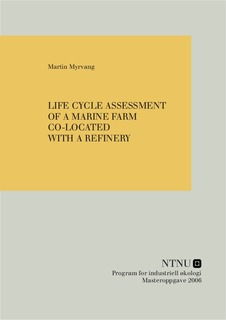| dc.contributor.author | Myrvang, Martin | nb_NO |
| dc.date.accessioned | 2014-12-19T12:34:48Z | |
| dc.date.available | 2014-12-19T12:34:48Z | |
| dc.date.created | 2007-02-26 | nb_NO |
| dc.date.issued | 2006 | nb_NO |
| dc.identifier | 122115 | nb_NO |
| dc.identifier.uri | http://hdl.handle.net/11250/242595 | |
| dc.description.abstract | A hybrid life cycle assessment of a land based turbot farm was conducted. The aquaculture facility has large heat requirements regarding water. The base case in the study utilise low quality waste heat from the refinery at Mongstad through a heat exchanging process. It has been a comparative study investigating various energy sources heating the water volumes in the system. Comparing with using heat as a by-product at Mongstad, economic costs and environmental impacts increase significantly by using other energy sources, according to the results in this report. Land based aquaculture proves to be an industry with driving incentives for by-product exchange at Mongstad. The refinery benefits from lower waste heat emissions, and the industrial activity in the region expands when initialising such a system at Mongstad.
Concerning sustainability of the aquaculture facility this report states that the upstream processes of feed production are important. Conventional fishery to obtain the marine ingredients, and the production of diesel intended for the vessels, are the most important processes in the system in terms of environmental load. Agricultural products, and oceanic freight connected to them, constitute considerable part of the total environmental impact. In the rest of the system, the construction of fish tank area and installation of technical equipment stand for the largest environmental impact, mainly from purchases in the construction and metals sectors. The use of chemicals for disinfection purposes and in the construction of the pipe system has noticeable environmental impacts.
The energy scenarios were based on using electricity, heavy fuel oil and natural gas and they were compared to the base case, using waste heat. Heating the water with electricity purchased from the Norwegian grid lead to moderate increases in environmental impact, and is economically preferable compared to fossil fuels. Using heavy industrial oil to heat the water leads to large increases in impacts from the system. Combustion of natural gas lead to smaller increases in impact than oil, compared to using waste heat, but bears the largest production costs of the alternatives. | nb_NO |
| dc.description.abstract | En hybrid livssyklusanalyse har blitt utført på et landbasert oppdrettsanlegg for piggvar. Oppdrettsanlegget har et stort oppvarmingsbehov for vann. Basis systemet i studien utnytter spillvarme av lav kvalitet fra raffineriet på Mongstad gjennom varmeveksling. Studien har vært komaprativ med hensyn på ulike energikilder brukt i oppvarmingen av vannmassene i systemet. Resultatene viser at de økonomiske kostnadene og miljøbelastningene øker betraktelig ved bruk av konvensjonelle energikilder kontra raffineriets spillvarme. Landbasert akvakultur er således en industri med gode insentiver for bi-produkt utveksling på Mongstad. Raffineriet vil dra nytte av senkede varmeutslipp, og regionen Nord-Hordaland vil få utvidet sin industri aktivitet ved oppstart av et slikt system på Mongstad.
Når det gjelder bærekraftighet ved oppdrettsanlegget er det vist i denne studien at oppstrømsprosessene til fòrproduskjonen spiller en viktig rolle. Konvensjonelt fiske for anskaffelse av marine ingredienser, og produksjonen av diesel til fartøyene, er de viktigste prosessene i systemet med tanke på miljøbelastning. Produksjon av jordbruksvarer, og oversjøisk frakt av disse, utgjør også en betydelig del av den totale miljøbelastningen. Bygging av tankområdene og installasjonen av teknisk utstyr i fasilitetene har den største miljøbelastningen for resten av systemet, hovedsakelig gjennom økonomiske kjøp fra metall og bygg sektorene. Bruken av kjemikalier for å rense vannet og i konstruksjon av rørsystemet har merkbare miljøbelastninger.
I et scenario er norsk elektrisitet brukt til oppvarming i systemet. Dette fører til moderat økning i miljø-belastningene i forhold til basis systemet, og er et økonomisk foretrukket alternativ i forhold til de to tilfellene med fossile energikilder. Oppvarming av vannet ved fyringsolje fører til stor økt miljøbelastning fra systemet i forhold til basis tilfellet. Forbrenning av naturgass fører til mindre økt miljøbelastning enn fyringsolje i forhold til utnyttelse av spillvarme, men innebærer de største produksjonskostnadene av samtlige alternativer. | nb_NO |
| dc.language | eng | nb_NO |
| dc.publisher | Program for industriell økologi | nb_NO |
| dc.title | Life Cycle Assessment of a marine farm co-located with a refinery | nb_NO |
| dc.type | Master thesis | nb_NO |
| dc.contributor.department | Norges teknisk-naturvitenskapelige universitet, Fakultet for ingeniørvitenskap og teknologi, Program for industriell økologi | nb_NO |
